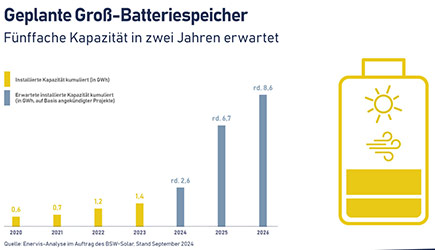
BSW-Solar forecasts five-fold increase in large-scale battery storage capacity by 2026
According to the German Solar Industry Association (BSW-Solar), the capacity of large-scale battery storage systems in Germany could increase fivefold within the next two years. However, in view of the rapid expansion of photovoltaic systems, the association is calling for a further acceleration of storage expansion. To achieve this, it is necessary to remove legal hurdles as quickly as possible.
The expansion of storage capacities for solar energy is a key component for the success of the energy transition. In order to further accelerate this, the solar and storage industry lobby is calling for existing obstacles to the installation and operation of storage systems to be removed before the end of this legislative period.
At present, BSW-Solar expects the currently installed capacity of large battery storage systems in Germany to increase fivefold. This currently stands at around 1.8 gigawatt hours in systems with a connected load of at least one megawatt. According to a market analysis by Enervis, an additional seven gigawatt hours could be added by 2026 as a result of pre-registered projects and company announcements.
In addition to large-scale storage systems, photovoltaic home storage systems and commercial battery systems are also contributing to the increase in total capacity. By mid-2024, 1.51 million home storage systems with a total capacity of around 13 gigawatt hours had been installed in Germany. Commercial storage systems contribute a further 1.1 gigawatt hours, bringing the total capacity to around 16 gigawatt hours.
Urgent need for action for expansion
The demand for storage solutions is growing steadily, as the installed photovoltaic capacity in Germany already exceeds 90 gigawatts. When it is particularly sunny, the result is low electricity prices and, in some cases, the throttling of systems. Battery storage systems offer the opportunity to use solar power with a time delay and thus prevent curtailment.
As a result, the association sees an urgent need for action to promote the expansion of battery storage systems promptly and effectively. Firstly, BSW-Solar is calling for a reduction in the disproportionate construction cost subsidies. These are an obstacle to the urgently needed flexibilization through energy storage. Secondly, it advocates a permanent exemption from double grid charges. In addition, it calls for large-scale storage systems to be given preferential treatment under building law in the approval process - just like other energy transition technologies.
Prospects and opportunities through electricity storage
At present, the expansion of large-scale storage facilities is mainly driven by fluctuations on the electricity market. The business model of profiting from the price differences between cheap and expensive times on the electricity exchange enables projects to be implemented even without additional subsidies.
According to Carsten Körnig, Managing Director of BSW-Solar, large-scale storage systems offer considerable potential as they better balance the consumption and generation of solar and wind energy and reduce grid overloads. Generation peaks should therefore be used efficiently with flexible consumers, battery storage systems and electrolysers instead of shutting down systems. The expansion of storage systems is the central building block for the energy transition and for a more reliable power supply in the future.
Image: Bundesverband Solarwirtschaft e.V.
Sources: pv-magazine.de, Sandra Enkhardt, 02.10.2024
solarwirtschaft.de, Johann Sternberg, 02.10.2024













